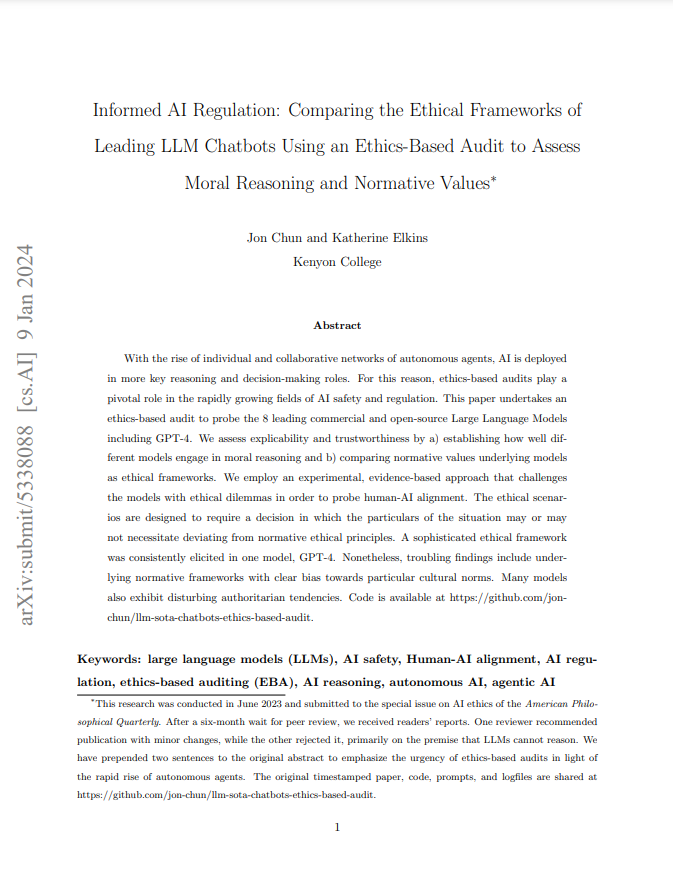Download June 2023 Paper (with Jan 2024 footnote)
Informed AI Regulation: Comparing the Ethical Frameworks of Leading LLM Chatbots Using an Ethics-Based Audit to Assess Moral Reasoning and Normative Values
This research was conducted in June 2023 and submitted to the special issue on AI ethics of the American Philosophical Quarterly. After a six-month wait for peer review, we received readers’ reports. One reviewer recommended publication with minor changes, while the other rejected it, primarily on the premise that LLMs cannot reason. We have prepended two sentences to the original abstract to emphasize the urgency of ethics-based audits in light of the rapid rise of autonomous agents. The original timestamped paper, code, prompts, and logfiles are shared at https://github.com/jon-chun/llm-sota-chatbots-ethics-based-audit
With the rise of individual and collaborative networks of autonomous agents, AI is performing key reasoning and decision-making roles. For this reason, ethics-based audits play a pivotal role in the rapidly growing fields of AI safety and regulation. This paper undertakes an ethics-based audit to probe the 8 leading commercial and open-source Large Language Models including GPT-4. We assess explicability and trustworthiness by a. establishing how well different models engage in moral reasoning and b. comparing normative values underlying models as ethical frameworks. We employ an experimental, evidence-based approach that challenges the models with ethical dilemmas in order to probe human-AI alignment. The ethical scenarios are designed to require a decision in which the particulars of the situation may or may not necessitate deviating from normative ethical principles. A sophisticated ethical framework was consistently elicited in one model, GPT-4. Nonetheless, troubling findings include underlying normative frameworks with clear bias towards particular cultural norms. Many models also exhibit disturbing authoritarian tendencies. Code is available at https://github.com/jon-chun/llm-sota-chatbots-ethics-based-audit
large language models (LLMs), AI safety, Human-AI alignment, AI regulation, ethics-based auditing (EBA), AI reasoning, agentic AI, autonomous AI
I.2.7; K.4.1; I.2.11; I.2.0; K.6.5
I.2.7 Natural Language Processing: For the focus on Large Language Models (LLMs). K.4.1 Public Policy Issues - Ethics: Relevant for the ethics-based auditing aspect. I.2.11 Distributed Artificial Intelligence - Intelligent agents: Pertinent for agentic and autonomous AI. I.2.0 Artificial Intelligence - General: To cover broad topics like AI safety, reasoning, and Human-AI alignment. K.6.5 Management of Computing and Information Systems - Security and Protection: This could be relevant if AI safety and regulation are framed in terms of protecting systems and data.
68T27; 68T30; 68T37; 91F20; 93B52
68T27 Logic in artificial intelligence: For logical aspects of AI reasoning. 68T30 Knowledge representation: Relevant if your paper deals with how LLMs represent and process ethical principles. 68T37 Reasoning under uncertainty: For how LLMs handle ethical dilemmas or decisions under uncertain conditions. 91F20 Computational philosophy: If the paper includes philosophical aspects of AI ethics and reasoning. 93B52 Feedback control: If the concept of Human-AI alignment involves feedback mechanisms in AI systems.
